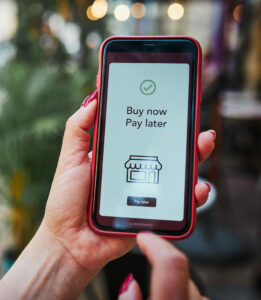 (From the Financial Literacy Blog) – Buy Now, Pay Later (BNPL) is a payment option that is quickly growing in popularity. When someone is about to make their purchase at a retailer’s checkout, they may receive a BNPL offer, which would allow them to make their purchase with little or no money down—instead paying it off in a series of installments at later dates. It’s a type of short-term financing that is often interest-free. For shoppers, using BNPL can be very convenient, but people should have a good understanding of the pros and cons before choosing that option.
(From the Financial Literacy Blog) – Buy Now, Pay Later (BNPL) is a payment option that is quickly growing in popularity. When someone is about to make their purchase at a retailer’s checkout, they may receive a BNPL offer, which would allow them to make their purchase with little or no money down—instead paying it off in a series of installments at later dates. It’s a type of short-term financing that is often interest-free. For shoppers, using BNPL can be very convenient, but people should have a good understanding of the pros and cons before choosing that option.
Pros:
Increased Convenience
Whether someone is shopping online or in-store, the BNPL option is integrated into checkout, which makes the process simple and convenient. For those who want to make a purchase, but don’t have enough funds on-hand or in their account at that moment, this payment option allows them to get the item immediately. Depending on the BNPL option, they can get their item with little or no money down. The remaining balance would be billed to their debit or credit card in a series of weekly or monthly payments until the purchase is paid in full. Credit checks are also not required for the vast majority of BNPL options. If someone is having trouble getting approved for a credit card because of poor or no credit, BNPL can be a convenient alternative.
Lack of Interest
One of the most enticing selling points of BNPL options is that they are generally interest-free. If the repayment terms have someone paying over multiple months on a BNPL purchase, they wouldn’t spend more than they would have if they paid in full immediately. This wouldn’t be the case with most credit cards, as interest is charged to the balance on a credit card monthly. However, interest and fees on BNPL can be charged if scheduled payments are missed.
Automatic Payments
Instead of someone having to log into their online or mobile banking service to make every payment, BNPL makes things easy. When applying for BNPL at checkout, the buyer chooses where the installment payments will be taken from. As the payments are due, the BNPL provider takes the money out automatically. This makes it easy on the buyer, as it eliminates the chances of missing a payment through human error. However, it’s important to note that even automatic payments can still not clear if there are insufficient funds in the account. Whether it’s BNPL or any other automatic withdrawal, people should ensure there are enough funds in their account for when payments are pulled.
Cons:
May Lead to Impulse Purchases
Because it’s so easy and accessible, services like BNPL can lead to people spending impulsively. Immediately having access to a product or service without having to pay the full price up front makes it easier than ever rack up debt by overspending. While full payment isn’t required immediately, that money still needs to be paid eventually. Before anyone makes a purchase using BNPL, they should ask themselves, “If I can’t afford this right now, will I actually be able to in a few weeks?” If not, people shouldn’t use a BNPL service.
Can Negatively Impact Credit Scores
While enrolling in BNPL typically doesn’t involve checking the buyer’s credit score, missed payments may be reported to the credit bureaus. This means the buyer’s credit can still be affected by the service. Missed or late payments can lower someone’s score and make it more challenging for them to qualify for loans or credit cards in the future.
Potential for Fees and Penalties
A major selling point of BNPL is that the service is interest-free. While that is true if payments are made on time, interest and fees can be charged after late or missed payments. Late fees are usually in the $5 to $10 range and are sometimes capped at 25% of the purchase value. It’s important for people to review terms and conditions before enrolling, as unexpected fees can add up.
If the option to use Buy Now, Pay Later presents itself, should people enroll? The choice is a personal one—much like using any other financial product. People should review the pros and cons and consider their own spending habits and financial situation to determine if BNPL is a good option for them.
If you have questions about the latest payment options, contact your local credit union!
